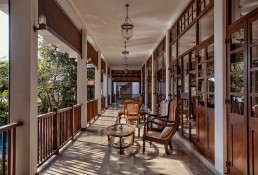Brand Standards: The Postcard Hotel
With its sights set on 50 openings in five years, The Postcard Hotel is seeking to shift the luxury hospitality paradigm in India and beyond.
Launched in December 2018 with three properties in Goa, The Postcard Hotel announced international expansion beyond its home base of India within the first year, opening in Bhutan and Sri Lanka at the end of 2019. On a mission to disrupt rules and set new standards in experiential luxury, the brand pillars include authenticity, immersive inclusions, superlative service and distinctive design rooted in the local vernacular.
It’s no easy task to change narratives in an established industry, but that’s exactly what veteran Kapil Chopra has set out to achieve with his own luxury hospitality venture, which he founded 13 months ago with a trio of intimate Goan properties. His vision for The Postcard Hotel revolves around innovation, nimble thinking and positive disruption. “We last saw big innovations in luxury hospitality over 20 years ago when Six Senses and Aman came along,” he says. “Since then, I feel that brands have largely stopped questioning, pushing the frontiers and evolving.”
His response to this perceived stagnation is a collection of small characterful hotels in compelling leisure destinations, targeting discerning travellers with personalisation and immersive experiences designed to create memories and plug into local cuisine, wellness, wildlife and lifestyles. In addition to the Goan hotels, all of which are converted heritage buildings, properties have since sprung up in Bhutan’s Thimphu Valley and Sri Lanka’s coastal town of Galle. To reflect today’s travel needs, each offers flexible check-in and check-out over 24 hours, breakfast anytime and complimentary beverage inclusions – as standard. The rest of the experience is tailored to individual guest needs, with an emphasis on slowing down time, harking back to a simpler era.
CARVING A NEW NICHE
Drawing on 25 years in the business, including most recently as President of Oberoi Hotels & Resorts, Chopra explains how he came to identify a gap in the market: “During my years with Oberoi, we’d seen significant increases in occupancy and room rates, driven primarily by an Indian demographic. At the same time, Airbnb had established itself with people willing to pay prices that were, at times, higher than equivalent room rates simply because they wanted the experience despite the uncertainty of service. We have had iconic resorts typically offering beautiful design and the same line-up of facilities but not really tapping into innovation or experiential travel. So I asked what I could learn while recognising there was a niche to be filled.”
Chopra breaks down the hospitality landscape into five broad categories: the first comprises basic lodgings; second, products with decent hotel rooms but lacking service; third, existing luxury brands; and fourth, experiential providers such as Airbnb that aim to let people live like locals. He sees The Postcard as the fifth, an amalgamation of distinctive hotels in premium locations offering both experiential travel and exceptional service. “I call it transformational luxury,” he elaborates. “So when you stay with us, I want you to leave with memories, whether that’s scheduling in time for a consultation with an Ayurvedic doctor who is willing to follow up with you at home and facilitate change. Or by taking you into the middle of the Arabian Sea to catch the sunrise on a boat, or by inviting you to learn how to cook a fish curry with a Goan housewife.”
CULTURAL RICHES
While The Postcard has already gone international, Chopra sees his Goan hotels as just the beginning of a regional portfolio that will exploit some of the 334 villages making up the destination. “We have the opportunity to position Goa as India’s equivalent of Bali,” he enthuses. “It has a magical confluence of architecture, design, cuisine, music and history, with the potential to become our cultural capital, but we need to change the narrative, elevating it back onto the high society circuit again.”
Dotted from south to north, The Postcard’s three hotels are under ten rooms each, ranging from an elegant ancestral abode in the heritage village of Moira to a colonial hideout set among a verdant forest reserve in Velha and a Portuguese-influenced residential estate with its own 350-year-old chapel, overlooking the paddy fields of Cuelim. The restoration approach has been sympathetic with Mangalorean tiles, laterite and black Kadappa stone favoured in Moira, for example, because of their ability to cope with monsoon conditions. Large courtyards and balconies extend rooms out to the tranquil exterior, where guests are invited to discuss their food requirements with the resident chef, who advises on the catch of the day and seasonal options before serving artisanal meals. At the Goan properties, you won’t be offered a croissant, rather a poi bread. “There are over 20 ethnic breads in India, and we want to showcase this culinary heritage while thinking sustainably about our sourcing,” notes Chopra.
Serious consideration has also been given to wellbeing. Based in-house, Ayurvedic specialist Dr. Mubash Basheer consults with guests who are interested in addressing a medical condition or taking preventative action. “Indians are predisposed to obesity, insomnia, digestive issues and back problems so our Ayurvedic centre is able to provide relevant lifestyle prescriptions,” explains Chopra. “We want to send you back a little more healthy and well.”
BULLISH EXPANSION
Growing his team organically, Chopra is supported by executives including Senior Vice President of Operations, Akanksha Lamba. In Goa, notable partners have included Akshat Bhatt of Architecture Discipline and photographer JJ Valaya whose black and white prints adorn walls. Outside India, The Postcard’s internal design team has worked closely with owners Kinley Tshering and Tshering Zangmo in Bhutan, and Dian Gomes in Sri Lanka to achieve architectural and aesthetic authenticity in each location.
There are at least eight more Indian hotels in the pipeline, some signed under long-term lease arrangements or management contracts and a few owned by the company, including a property on the Arabian Sea and land parcels ripe for development in Kanha and Ranthambore. The first complete newbuild has already been announced as a serene beach location in South Goa where the 50 rooms and suites will be designed by Bill Bensley’s Bangkok-based atelier. Sandeep Khosla of Khosla Associates meanwhile has been drafted in to work on an intriguing wildlife hotel in Karnataka while Luca Franco of Luxury Frontiers is the selected partner for two jungle resorts.
India is only one part of the expansion strategy however, with The Postcard seeking to own or manage more than US$1 billion of hotel assets within five years, be they conversions or newbuilds. “To achieve our goal of 50 hotels, we will need to sign another six to seven properties annually and we’re on track to achieve this,” says Chopra. “The potential for The Postcard Hotel extends beyond a single continent when you consider the flow of outgoing tourists from India. Homegrown Indian hotel companies lack a visible and strong presence in Europe so I see immediate potential in France and Italy. But who’s to say that a heritage property in Havana is out of our reach? The key consideration remains handpicked locations that allow us to deliver experiential and transformational holidays to luxury leisure travellers.”
Words: Neena Dhillon
This article originally ran in Sleeper 88.
Related Posts
9 January 2020
Room Mate Hotels unveils new brand
30 November 2015
European Hotel Design Awards 2015
21 January 2015




